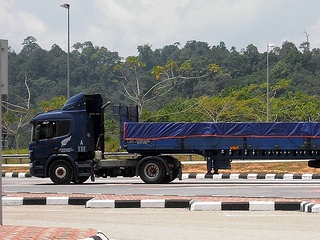 The Malaysian logistics industry is expected to grow 9.5 percent to MYR139.74 billion (US$46.34 billion) in 2013 from an estimated MYR127.66 billion a year ago, driven by a strong intra-Asia trade and the country’s sustainable economic growth, says Frost & Sullivan.
The Malaysian logistics industry is expected to grow 9.5 percent to MYR139.74 billion (US$46.34 billion) in 2013 from an estimated MYR127.66 billion a year ago, driven by a strong intra-Asia trade and the country’s sustainable economic growth, says Frost & Sullivan.
Government support for the logistics sector and Malaysia’s strategic location will also propel growth, said Gopal R, global vice president of transportation and logistics practice at Frost & Sullivan.
External trade for Malaysia is expected to increase 6.5 percent to RM1.42 trillion in 2013, he added. “Growth of the country’s external trade signifies the growth of the transportation and logistics industry especially for import and export forwarding, air freight, and ocean freight-related businesses.”
The positive outlook on foreign direct investments inflows is also expected to drive the transportation and logistics market.
Malaysia’s exports for the 10 months of 2012 increased 1.1 percent, while imports grew 7.4 percent as compared to 2011. Trade with members of the Association of Southeast Asian Nations accounts for 27.4 percent of Malaysia’s trade. “Exports to ASEAN increased by 10.1 percent while imports grew by 7.5 percent despite the challenging global trading environment,” Gopal said.
The Malaysian logistics industry is forecast to grow at a compound annual growth rate of 10.2 percent to reach MYR207.4 billion in 2017.
Gopal forecasts Malaysia’s total cargo volumes (air, rail, and sea) to grow moderately at 5 percent, reaching 530.67 million tons in 2013.
Sea freight is expected to grow 5 percent to 523.3 million tons in 2013. “Containerized cargo represents more than 70 percent of total cargo throughput by sea in the country; of which about 47 percent is handled by Port Klang,” Gopal said.
Cargo by rail is expected to increase to 6.47 million tons in 2013, and airfreight, affected by the recent global economic slowdown, is seen to increase by only 1.1 percent to 900,000 tons in 2013.
Malaysia’s role as a transshipment hub is growing due to the country’s strategic geographical location. In 2012, transshipment accounted for 22.5 percent of total sea cargo throughput.
Gopal said that contract logistics is likely to generate substantial revenue stream for logistics companies because of the growing trend to outsource non-core logistics functions to third parties.
Photo: Auswandern Malaysia




